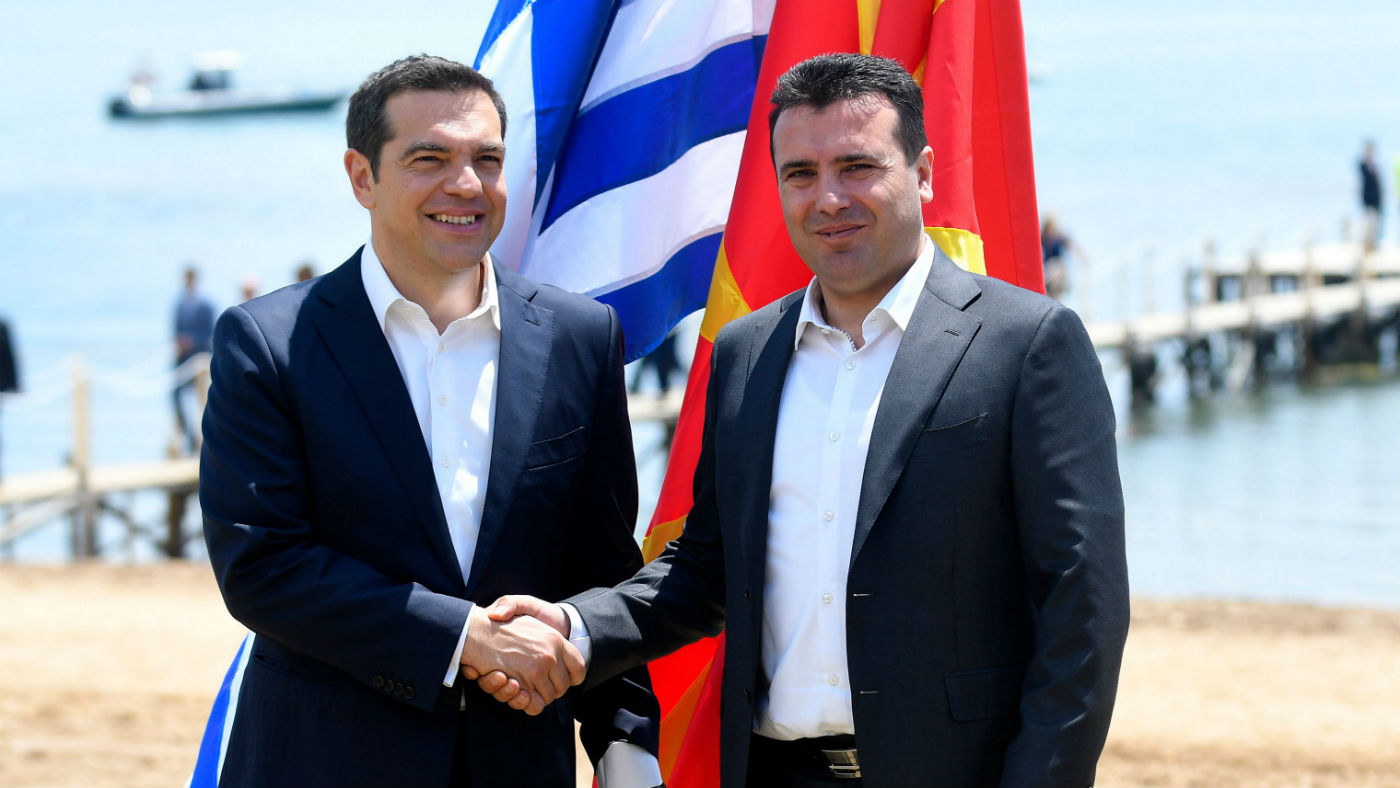Republic of North Macedonia born amid mass protests
Alexis Tsipras survives no confidence vote to bring end to long-running saga with northern neighbour one step closer

A free daily email with the biggest news stories of the day – and the best features from TheWeek.com
You are now subscribed
Your newsletter sign-up was successful
The Greek Prime Minister, Alexis Tsipras, has survived a vote of no confidence and signed a historic accord with neighbouring Macedonia to settle a long-running dispute over its name.
Last week it was announced the former Yugoslav republic of Macedonia had agreed a deal with the Greek government to rename itself the “Republic of North Macedonia”.
What’s the controversy?
The Week
Escape your echo chamber. Get the facts behind the news, plus analysis from multiple perspectives.

Sign up for The Week's Free Newsletters
From our morning news briefing to a weekly Good News Newsletter, get the best of The Week delivered directly to your inbox.
From our morning news briefing to a weekly Good News Newsletter, get the best of The Week delivered directly to your inbox.
Greece has been in dispute with Macedonia since 1991, arguing its name could imply territorial claims over the Greek province of Macedonia and an appropriation of ancient Greek culture and civilisation.
Political opponents had accused Tsipras of making too many concessions over the deal, leading thousands of Greeks to protesting against the accord outside parliament on Saturday and calling the prime minister a “traitor”.
Reuters says the storm of protest over “a deal seen as a national sellout by some on both sides” has laid bare the intense opposition to the accord in both countries.
An opinion poll by the Proto Thema newspaper found up to 70% of Greeks object to the compromise, with Macedonian nationalists vowing to defend the country's name and pride.
A free daily email with the biggest news stories of the day – and the best features from TheWeek.com
What was at stake?
Had Tsipras lost the confidence vote, it would most likely have signalled early elections, with the issue of Macedonia’s name change front and centre of the campaign.
His narrow victory enabled the foreign ministers of Greece and Macedonia to sign the accord at a ceremony on Sunday in the presence of representatives from the UN and EU.
What happens next?
The agreement still requires the approval of both parliaments and a referendum in Macedonia.
Reuters says “that approval is far from assured, as it faces stiff opposition from the Greek public, and Macedonia’s president has vowed to block the deal”.
Under the deal, Greece will lift its objections to the renamed nation joining the EU and Nato, a move which will be opposed by Russia.
“There will be fears that Russia may now try to somehow influence the vote,” James Ker-Lindsay, professor of politics and policy at St. Mary’s University in London, told Reuters. “Given recent allegations of Moscow’s involvement in other elections and referendums, this will be a real concern for Nato and the EU.”
-
 Why are election experts taking Trump’s midterm threats seriously?
Why are election experts taking Trump’s midterm threats seriously?IN THE SPOTLIGHT As the president muses about polling place deployments and a centralized electoral system aimed at one-party control, lawmakers are taking this administration at its word
-
 ‘Restaurateurs have become millionaires’
‘Restaurateurs have become millionaires’Instant Opinion Opinion, comment and editorials of the day
-
 Earth is rapidly approaching a ‘hothouse’ trajectory of warming
Earth is rapidly approaching a ‘hothouse’ trajectory of warmingThe explainer It may become impossible to fix
-
 Epstein files topple law CEO, roil UK government
Epstein files topple law CEO, roil UK governmentSpeed Read Peter Mandelson, Britain’s former ambassador to the US, is caught up in the scandal
-
 Iran and US prepare to meet after skirmishes
Iran and US prepare to meet after skirmishesSpeed Read The incident comes amid heightened tensions in the Middle East
-
 Israel retrieves final hostage’s body from Gaza
Israel retrieves final hostage’s body from GazaSpeed Read The 24-year-old police officer was killed during the initial Hamas attack
-
 China’s Xi targets top general in growing purge
China’s Xi targets top general in growing purgeSpeed Read Zhang Youxia is being investigated over ‘grave violations’ of the law
-
 Panama and Canada are negotiating over a crucial copper mine
Panama and Canada are negotiating over a crucial copper mineIn the Spotlight Panama is set to make a final decision on the mine this summer
-
 Why Greenland’s natural resources are nearly impossible to mine
Why Greenland’s natural resources are nearly impossible to mineThe Explainer The country’s natural landscape makes the task extremely difficult
-
 Iran cuts internet as protests escalate
Iran cuts internet as protests escalateSpeed Reada Government buildings across the country have been set on fire
-
 US nabs ‘shadow’ tanker claimed by Russia
US nabs ‘shadow’ tanker claimed by RussiaSpeed Read The ship was one of two vessels seized by the US military